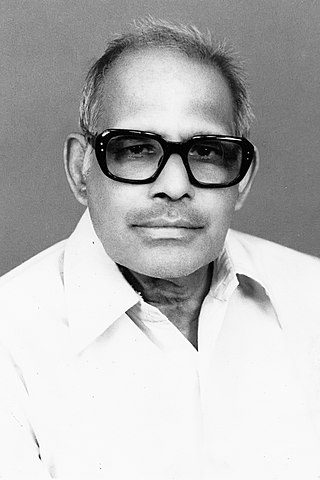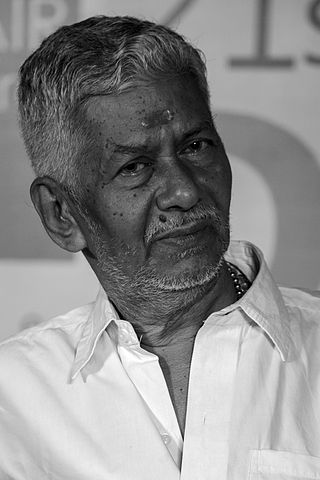Related Research Articles

Malayalam is a Dravidian language spoken in the Indian state of Kerala and the union territories of Lakshadweep and Puducherry by the Malayali people. It is one of 22 scheduled languages of India. Malayalam was designated a "Classical Language of India" in 2013. Malayalam has official language status in Kerala, Lakshadweep and Puducherry (Mahé), and is also the primary spoken language of Lakshadweep. Malayalam is spoken by 35 million people in India. Malayalam is also spoken by linguistic minorities in the neighbouring states; with a significant number of speakers in the Kodagu and Dakshina Kannada districts of Karnataka, and Kanyakumari, Coimbatore and Nilgiris district of Tamil Nadu. It is also spoken by the Malayali Diaspora worldwide, especially in the Persian Gulf countries, due to the large populations of Malayali expatriates there. They are a significant population in each city in India including Mumbai, Bengaluru, Chennai, Delhi, Hyderabad etc.

Malayalam, the lingua franca of the Indian state of Kerala and the union territories of Lakshadweep and Puduchery, is one of the six classical languages of India. Malayalam literature comprises those literary texts written in Malayalam, a South-Dravidian language spoken in the Indian state of Kerala. The first travelogue in any Indian language is the Malayalam Varthamanappusthakam, written by Paremmakkal Thoma Kathanar in 1785. Malayalam literature has been presented with 6 Jnanapith awards, the second-most for any Dravidian language and the third-highest for any Indian language.
In linguistics, syllable weight is the concept that syllables pattern together according to the number and/or duration of segments in the rime. In classical Indo-European verse, as developed in Greek, Sanskrit, and Latin, distinctions of syllable weight were fundamental to the meter of the line.

Thunchaththu Ramanujan Ezhuthachan was a Malayalam devotional poet, translator and linguist. He was one of the prāchīna kavithrayam of Malayalam literature, the other two being Kunchan Nambiar and Cherusseri. He has been called the "Father of Modern Malayalam Literature", and the "Primal Poet in Malayalam". He was one of the pioneers of a major shift in Kerala's literary culture. His work is published and read far more than that of any of his contemporaries or predecessors in Kerala.

The Malayali people are a Dravidian ethnolinguistic group originating from the present-day state of Kerala & Union Territory of Lakshadweep in India, occupying its southwestern Malabar coast. They form the majority of the population in Kerala and Lakshadweep. They are predominantly native speakers of the Malayalam language, one of the eleven classical languages of India. The state of Kerala was created in 1956 through the States Reorganisation Act. Prior to that, since the 1800s existed the Kingdom of Travancore, the Kingdom of Cochin, Malabar District, and South Canara of the British India. The Malabar District was annexed by the British through the Third Mysore War (1790–92) from Tipu Sultan. Before that, the Malabar District was under various kingdoms including the Zamorins of Calicut, Kingdom of Tanur, Arakkal kingdom, Kolathunadu, Valluvanad, and Palakkad Rajas.
The Niranam poets, also known as the Kannassan poets, were three poets from the same family by the names of Madhava Panikkar, Sankara Panikkar, and Rama Panikkar. They hailed from Niranam, a small village in southern Kerala, India, near the town of Thiruvalla. Their works mainly comprised translation and adaptation of Sanskrit epics and Puranic works and were for devotional purposes. They lived between 1350 and 1450 C.E.

Edasseri Govindan Nair was an Indian poet and playwright of Malayalam literature. Known as one of the major poets of Malayalam, Edasseri was a recipient of the Sahitya Akademi Award and the Kerala Sahitya Akademi Award for Poetry. He was also a recipient of Asan Smaraka Kavitha Puraskaram, which was awarded posthumously.

The culture of Kerala has developed over the past millennia, with influences from other parts of India and abroad. It is defined by its antiquity and the organic continuity sustained by the Malayali people. Modern Kerala society took shape owing to migrations from different parts of India and abroad throughout Classical Antiquity.

Kudiyirikkal Narayanan Ezhuthachan was an Indian writer and scholar of Malayalam literature. He was one among the principal followers of the idea of social impact on literature. Ezhuthachan supported Marxist literary criticism and interpreted Indian literary works based on Marxist aesthetics. He won the Sahitya Akademi Award for his work Keralodayam, a long narrative poem written in Sanskrit. He is the first Malayali to win Sahitya Akademi Award in Sanskrit. He died on 28 October 1981 while delivering a lecture at Calicut University.

Olappamanna Mana Subramanian Namboothirippad, better identified by his family name, Olappamanna , was an Indian poet of Malayalam literature. A former chairman of Kerala Kalamandalam and an author of 20 books of poetry, his poems were noted for their explicit social expressions. He received two awards from Kerala Sahitya Academy and another from Kendra Sahitya Academy, besides honours such as Government of Madras Poetry Prize, Odakkuzhal Award, N. V. Puraskaram, Asan Smaraka Kavitha Puraskaram and Ulloor Award.
Sanskrit prosody or Chandas refers to one of the six Vedangas, or limbs of Vedic studies. It is the study of poetic metres and verse in Sanskrit. This field of study was central to the composition of the Vedas, the scriptural canons of Hinduism; in fact, so central that some later Hindu and Buddhist texts refer to the Vedas as Chandas.

S. Ramesan Nair was an Indian lyricist and poet who worked predominantly in the Malayalam film industry. Over his career he wrote songs for over 170 films and over 3,000 devotional songs outside of the films. He debuted with the movie Pathamudhayam in 1985. He was a recipient of the Kerala Sahitya Akademi Award in 2010 and the Kendra Sahitya Akademi Award in 2018 for his collection of poems Gurupournami.

Veerankutty is a Malayalam poet and former associate professor in Dept of Malayalam Govt College Madappally. He was born in Narayamkulam near Perambra in Kozhikode District, Kerala, India. Veerankutty worked as Head of Malayalam Department at MEASS College Areacode.

Narayanan Nambuthiri Kakkad, commonly known as N. N. Kakkad, was an Indian poet of the Malayalam language. Known for works such as Saphalmee Yathra, Pathalathinde Muzhakkam and Changatham, he was a Sanskrit scholar and was known to have been proficient in painting and music. He was a recipient of several awards including Odakkuzhal Award, Asan Smaraka Kavitha Puraskaram, Kerala Sahitya Akademi Award for Poetry and Vayalar Award.

R. Narayana Panickar was an Indian essayist, playwright, translator, lexicographer, novelist and historian of Malayalam. He was credited with over 100 books but the best known among them are the seven-volume work, Kerala Bhasha Sahitya Charitram, a comprehensive history of Malayalam literature up to 1951 and Navayuga Bhasha Nighantu, a lexicon. He also wrote a number of novels and translated several works including Purananuru, Akanaṉūṟu and Silappatikaram. He was also a historian and published works such as Thiruvithamkoor Charitram and Kerala Charitram. Sahitya Akademi honoured him with their annual award in 1955.
Kadathanat Madhavi Amma was an Indian poet, novelist and short story writer of Malayalam literature. Known for poetry anthologies such as Kalyopaharam and Kanikkonna, she was also the author of two works based on Vadakkan Pattukal viz. Thacholi Othenan and Payyamvelli Chandu. The Kerala Sahitya Akademi awarded her their annual award for overall contributions in 1996.

Old Malayalam, the inscriptional language found in Kerala from c. 9th to c. 13th century CE, is the earliest attested form of Malayalam. The language was employed in several official records and transactions. Old Malayalam was mostly written in Vatteluttu script. Most of the inscriptions were found from the northern districts of Kerala, those lie adjacent to Tulu Nadu. The origin of Malayalam calendar dates back to year 825 CE.
Middle Malayalam is the period of the Malayalam language spanning from 13th century to 15th century AD.
References
- ↑ Sreedharan, G. (1975). "Malayalam Poetry— A Kaleidoscopic View". Indian Literature. 18 (4): 12–26. ISSN 0019-5804. JSTOR 24157557.
- ↑ "When Malayalam found its feet". The Hindu. 2014-07-17. ISSN 0971-751X . Retrieved 2023-01-09.
- ↑ malayalamlyrics (2022-01-22). "Malayalam Kavithakal | Malayalam Poems". Malayalam Songs Lyrics. Retrieved 2023-02-19.